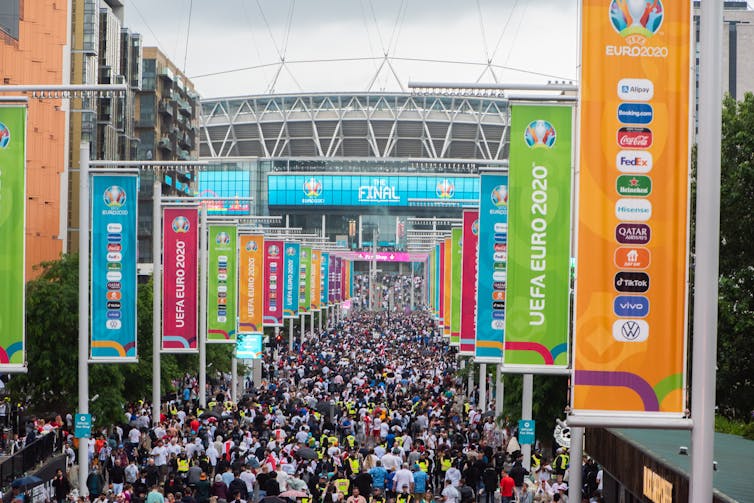The Club World Cup 2025 shows sharing the stage is the future of global sport
- Written by David Cook, Senior Lecturer in Marketing, Nottingham Trent University

Before it kicked off, the all new revamped and expanded men’s 2025 Fifa Club World Cup[1] had already attracted controversy.
Some think even more football matches at the end of a long season pose a risk to player welfare[2]. Others are concerned about a lack of fan engagement[3].
But aside from these issues the tournament, which features 32 clubs from around the world, provides fresh evidence of a new model emerging in global sport.
This event, which is being staged in 12 different cities across the US, is the latest experiment in “polycentric” hosting[4], where multiple locations collaborate as destinations for international sporting events.
Collaborative multi-host formats also allow for widespread sharing of knowledge and opportunities for innovation. When cities and organising committees work together, they can bring diverse perspectives, cultural insights, operational practices, and even healthy competition to the table.
We found that the development of friendly rivalries between Euro 2020 hosts actually encouraged a competitive mindset that motivated organising committee staff to attempt to outperform counterpart cities.
Read more: Trump's travel ban casts shadow over the upcoming Fifa Club World Cup and other US-hosted sporting events[15]
Meanwhile Uefa enabled those different cities to develop branding strategies which reflected local character while contributing to a broader European narrative of unity through sport. One example was each city selecting a landmark bridge to tie in with the tournament’s overarching “bridging Europe” theme[16].
This collaborative way of thinking also led to creative and inclusive ideas. Glasgow, for example, integrated a cultural festival[17] into its role as a host city, featuring local artists and musicians.
Polycentric tournaments aren’t without challenges of course. There is a risk of fragmentation, where the tournament feels like a series of disconnected mini-events rather than something cohesive.
But overall, the environmental, economic and cultural benefits can be substantial. And what began as a celebratory one-off with Euro 2020 is fast becoming the design for future major sport events.
By sharing the spotlight, cities and countries also share the strain and the opportunity. The age of the single host nation isn’t over, and the looming Saudi Arabia 2034 World Cup is a stark reminder that above all, money still talks[18]. But the era of shared hosting is clearly here, and might just be what global sport and its fans need.
References
- ^ Fifa Club World Cup (www.fifa.com)
- ^ risk to player welfare (fifpro.org)
- ^ lack of fan engagement (www.sportcal.com)
- ^ “polycentric” hosting (www.sportscienceresearch.com)
- ^ Sign up to our daily newsletter (theconversation.com)
- ^ pragmatic model of hosting (theconversation.com)
- ^ Our research (www.researchgate.net)
- ^ conceived as a celebration (www.taylorfrancis.com)
- ^ reached broad audiences (www.uefa.com)
- ^ multiple regions (www.ics-digital.com)
- ^ fall into disuse (www.tandfonline.com)
- ^ the environmental (www.researchgate.net)
- ^ do it alone (doi.org)
- ^ Michael Tubi/Shutterstock (www.shutterstock.com)
- ^ Trump's travel ban casts shadow over the upcoming Fifa Club World Cup and other US-hosted sporting events (theconversation.com)
- ^ “bridging Europe” theme (editorial.uefa.com)
- ^ a cultural festival (euro2020.scottishfa.co.uk)
- ^ money still talks (theconversation.com)







